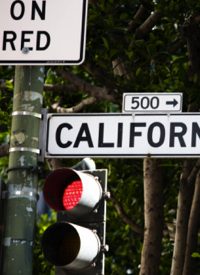
The cornerstone of American jurisprudence is that the accused is innocent until proven guilty. If your car is caught going through a red light by a traffic camera, however, you will be sent a ticket, even if you were not driving it at the time.
If you choose to fight the ticket in court, you will have to prove that you did not, in fact, run the red light — which is to say that under the existing traffic-camera system, you are considered guilty until you prove you’re innocent.
Because of this reversal of established judicial procedure, attorneys in Florida and Texas are fighting the very idea of red-light cameras, according to an ABC News report by John Wetenhall.
In Florida, wrote Wetenhall, a law firm “has filed 27 class action lawsuits against Florida municipalities, charging that they have operated the cameras without legal authority. The first ruling came in Orlando, where the city may be forced to refund over $4 million collected from over 50,000 tickets issued since the city started the program in September 2008.” A judge issued a summary judgment against the city, saying that “the city did not have the right to operate the cameras because by law, only the state has the power to allow the cameras,” according to Wetenhall, who added that the judge also raised the burden-of-proof issue in his ruling.
In Texas, Houston attorney Paul Kubosh organized a group that “gathered over 30,000 signatures on a petition that would put the cameras up for a vote before the community,” reported Wetenhall. “‘All I want is a vote. Just a vote!’ Kubosh told ABCNews.com.”
City governments and police departments, naturally, hold a different view of the camera issue. For one thing, they like the revenue the cameras generate. Wetenhall wrote that “Houston has collected more than $45 million in fines since it first installed the red light cameras in 2006.”
However, cities also claim that the cameras reduce accidents that cause serious injuries or fatalities. “Vicki King, assistant chief of information systems command for the Houston Police Department, cannot understand why people don’t want cameras that may reduce the ‘horrific’ car crashes that result from drivers running red lights,” Wetenhall reported. “King said the only goal is safety and wishes they could install more cameras in Houston.”
Camera opponents such as Kubosh point to studies that show that cameras at intersections result in an increase in rear-end collisions. Camera proponents agree but note that the same studies also found that right-angle collisions, which are more likely to cause injuries and fatalities, decreased at those same intersections. They believe the tradeoff is worth it to reduce injuries and save lives.
Alex Johnson, in a 2008 report for MSNBC, summed up the results of a 2005 Federal Highway Administration study on red-light cameras thus:
What is clear in the study, when it is taken overall, is that red light cameras led to no real change in the number of accidents (4,059 with versus 4,063 without). But they did reduce the number of people hurt in those accidents, by just less than 5 percent (459 versus 482).
The FHA concluded that cameras provide, at best, a “modest aggregate crash-cost benefit.”
Lubbock, Texas, actually shut its cameras down because of “a report that showed statistically significant increases in rear-end collisions at intersections, including those with cameras,” wrote Johnson.
Johnson, a bit more skeptical of government claims than Wetenhall, reported that some cities were turning off their red-light cameras because they were working too well. That is, they were causing drivers to be more cautious at intersections, with the result that traffic-ticket revenues were dropping.
In Dallas the revenue from the cameras for fiscal year 2008 came up $4 million short of expectations. “The city,” wrote Johnson, “turned off about a quarter of the least profitable cameras, saying it couldn’t justify the cost of running them.”
Johnson cited other examples of cities canning their cameras because they weren’t raking in the simoleons:
City officials in Charlotte and Fayetteville, N.C., recently turned off all of their red light cameras, concluding that a state law diverting much of the revenue they generate in fines to schools meant their general funds were actually losing money, NBC affiliate WNCN of Raleigh reported.
In Bolingbrook, Ill., meanwhile, officials ended their red light camera program after statistics showed a 40 percent drop in ticketable offenses.…
In Springfield, Mo., officials wanted to begin ticketing motorists caught on red light cameras last June 1. But the state Legislature was considering a law that would have diverted some of the revenue to state programs.
So Springfield officials postponed issuing the tickets. Only after it became clear a few weeks later that the Legislature would not act on the bill did Springfield start sending out tickets, NBC affiliate KYTV reported. The cameras began breaking even in January.
These stories would seem to bear out the contention of Tom McCarey of the National Motorists Association, who told Johnson, “It’s all about the money, and it’s not just the $100 fine. It’s millions for the city and billions for insurers.”
Whether the cameras are about the money or the safety, or a little bit of both, those who argue that the ticketing process violates the Constitution (because there is no way for an accused car owner to confront a camera) and the presumption of innocence almost certainly have the morally and legally superior position. Whether that position will prevail in today’s legal system, unfortunately, remains greatly in doubt.



